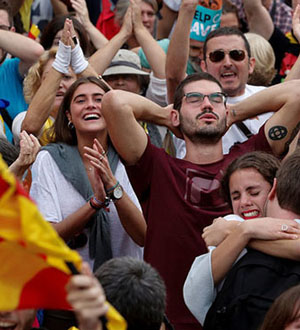Homage to Catalonia : déjà vu all over again .. it may belong in Spain but this isn’t the way to keep it there?
Oct 29th, 2017 | By Counterweights Editors | Category: In Brief
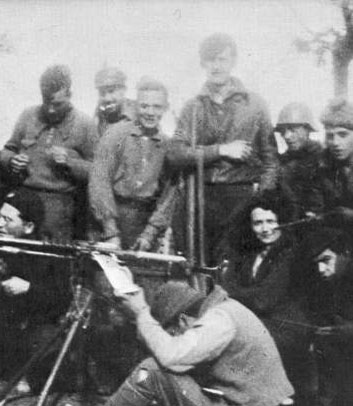
George Orwell with the POUM militia at the Aragón front in the Spanish Civil War, 1937. He is the tallest among the standing figures. The woman crouching just by his hand is his wife Eileen.
We’re following up here on the Catalonia part of L. Frank Bunting’s October 11 report on this site : “Canadian Thanksgiving 2017, Catalonia capers in Spain, and the unbearable lightness of Mélanie Joly” (subsequently UPDATED OCTOBER 13, 14, 15, 16, 20, 21!).
We’re also happy enough that, just this past Friday, October 27, 2017, Prime Minister Justin Trudeau declared Canada’s support for “one united Spain … after the Catalan regional parliament in Barcelona passed a motion unilaterally establishing a new country.”
At the same time, we’re happy as well to note the CBC Montreal report : “Catalan independence vote sparks contrasting opinions from Quebec and Canadian politicians … Prime Minister Justin Trudeau said Canada recognizes united Spain while Quebec premier calls for dialogue.”
Beyond this we’re just observers from a distance, perched on the northern shores of the North American Great Lakes, in front of desk-top internet monitors and big-screen TVs (and with warm memories of various Spanish visits in the 21st century). And we are especially impressed with eight particular observations from much closer to the action in Madrid and Barcelona :
* “Separatist lawmakers in Catalonia were unbowed …Â erupting in applause as their vote was approved with 70 votes in favor of an independent Catalan Republic, 10 against and two blank ballots out of a total 135 members.”
* “Within an hour of the Catalan vote, the Spanish Senate in Madrid voted 214 to 47 to invoke Article 155 of Spain’s Constitution, granting Prime Minister Mariano Rajoy extraordinary powers to take direct administrative control over the region and remove secessionist politicians.” (As best we can make out, 24 members of the Spanish Senate are from Catalonia?)
* “Mr. Rajoy’s conservative Popular Party has its origins in the neo-Francoist Allianza Popular, which was founded by former Franco ministers after the dictator’s death.”
* “however Rajoy chooses to implement Madrid’s takeover of Catalonia, it seems unlikely that his actions will end the era of ‘disorder’ there … something close to half of Catalonia’s electorate truly favors independence; that sentiment is unlikely to wane with Madrid’s intervention … the sectarian standoff will become even uglier in the days and weeks to come … The Spanish problem … is …Â The political pacts that were formed in 1978, following the death of Franco, appear to be falling apart.”
* “‘Two months ago, I would have said that 43 percent [turnout in the Madrid-repressed referendum that voted 90% for Catalan independence] was not enough,’ said Ester Romero, 25, a [Barcelona] sales manager who had come to the [pro-independence] rally … ‘But after all the oppression, after all the police hitting people during the referendum, it’s enough.’”
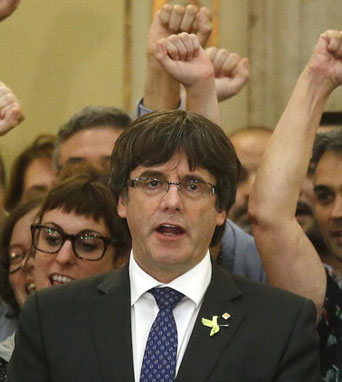
Catalan president (now officially ex-president) Carles Puigdemont as the Parliament of Catalonia declares independence on October 27.
* “Donald Tusk, the President of the European Council bluntly announced: ‘…nothing changes. Spain remains our only interlocutor.’ … Tellingly, Tusk added, ‘I hope the Spanish government favours force of argument, not argument of force.’”
* “The United States said Catalonia was an ‘integral part of Spain’ and that it supported Spanish government efforts to keep the nation ‘strong and united.’ … State Department spokeswoman Heather Nauert said the two NATO allies ‘cooperate closely to advance our shared security and economic priorities.’”
* “Regional elections in 2015 returned a slim majority of pro-independence lawmakers, who took this as a mandate to push ahead with the independence drive … Analysts predict a similar outcome in the upcoming ballot” (now scheduled by Spanish President Mariano Rajoy for this December 21, 2017).
For more than anyone ever really wanted to know about our own Canadian views on Homage to Catalonia 2017—18 click on “Read the rest of this page” and/or scroll down below.
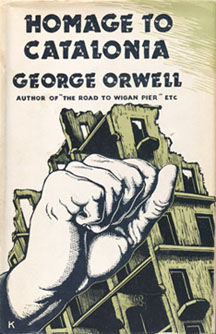 [UPDATE OCTOBER 31 : Meanwhile we’ve been impressed by Carles Puigdemont’s reaction to current events at a news conference in Brussels – “I ask the Catalan people to prepare for a long road. Democracy will be the foundation of our victory” – and his “announcement that he would accept the regional election on Dec. 21.” See the short but sweet Thomson Reuters report “Ex-Catalan president accepts snap election, says ‘long road’ to independence.”]
[UPDATE OCTOBER 31 : Meanwhile we’ve been impressed by Carles Puigdemont’s reaction to current events at a news conference in Brussels – “I ask the Catalan people to prepare for a long road. Democracy will be the foundation of our victory” – and his “announcement that he would accept the regional election on Dec. 21.” See the short but sweet Thomson Reuters report “Ex-Catalan president accepts snap election, says ‘long road’ to independence.”]
* * * *
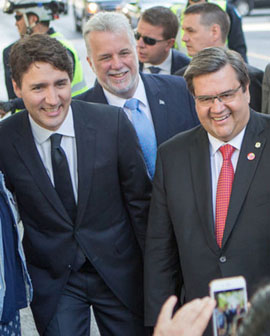
Left to right : Justin Trudeau, Prime Minister of Canada ; Philippe Couillard, Premier of Quebec ; Denis Coderre, Mayor of Montreal.
Whadda we know about Spain, of course, of course. But for what it’s worth our own Canadian view is that if Spain had a proper and robust system of genuine federalism (and see Bunting’s article on the very limited quasi-federalism Spain has now), Catalonia could find an ultimately comfortable place within a Spanish federation.
Put another way, if Catalonia could do in Spain what Quebec has finally been able to do in Canada, it wouldn’t have to declare independence from Spain.
Les Québécois et Québécoises (whom the Canadian House of Commons has already late in 2006 recognized as “a nation within a united Canada”) have been able to become “maîtres chez nous” in the early 21st century, as a result of traditions of Canadian federalism that began in the middle of the 19th century (and that have finally included two quite “legal” and democratic late 20th century referendums on something less than outright independence or secession, the second of which was alarmingly if not exactly honestly and openly close!).
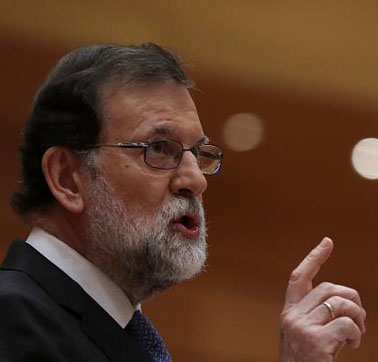
Spanish Prime Minister Mariano Rajoy as the Spanish Senate for the first time invokes Article 155 of the Spanish constitution of 1978, which allows the central government in Madrid to take over the government of an autonomous community in an emergency.
Some would urge that this case has still not been decisively proven even in Canada. And there is no doubt a sense in which such things can never be altogether confidently and definitively known for certain and forever. (The separatist PQ and BQ in Quebec could rise again etc.) But this is how things look to us right now in Canada. And we believe a stronger and more decentralized Spanish federalism could accommodate both Catalonia and the Basque country and beyond.
Meanwhile, we hope too that “the Spanish government favours force of argument, not argument of force.” We worry that Mariano Rajoy is still too “neo-Francoist” to bring this off.
And we worry that Franco’s destruction of the liberated “working-class” Barcelona which so impressed George Orwell (a destruction abetted by Stalin’s communist supporters of the Second Spanish Republic, who didn’t much like the radically democratic Catalonia of late 1936 and early 1937 either) will in one sad and sorry way or another happen all over again in 2017 and 2018.

Justin Trudeau, Liberal leader, introduces his son Xavier to Stephen Harper, Conservative prime minister, at the Calgary Stampede, July 2014.
And then how can anyone help but wonder : Will this precipitate some larger struggle on the Iberian peninsula that will somehow combine with Brexit to make the current not-so-united states of Europe almost as much of an anti-democratic political disaster as the current United States of America?
(Meanwhile we will somehow shuffle along in Canada, in both official languages, and with some degree of self-interested co-operation from the indigenous peoples of the true north strong and free, and the latest multicultural masses from all over the global village … and hope that some day democracy in America and the once mighty continent of Europe and its various adjacent northern islands will return … to our internet monitors and big-screen TVs.)
HISTORICAL BACKGROUND READING
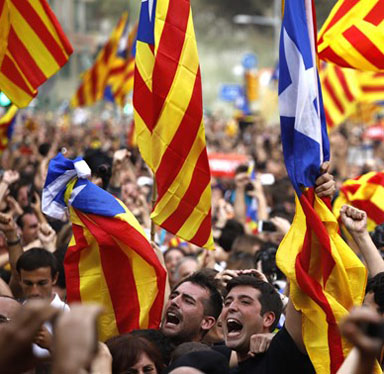 * “The four Catalan republics: 1641, 1873, 1931 and 1934.” Marc Pons, Tarragona. 24 September 2017.
* “The four Catalan republics: 1641, 1873, 1931 and 1934.” Marc Pons, Tarragona. 24 September 2017.
* “Civil War, Dictatorship, ‘Independentistas’ and Taxes: A Short History of Catalan Secession. The roots of Catalonia’s independence movement go way back, but the last few years–and weeks–have seen a rush toward the door.” Gregory Beals, Daily Beast. 30 September 2017.
* “July 1936 military uprising in Barcelona.” From Wikipedia, the free encyclopedia. A military uprising in Barcelona, the capital and main city of Catalonia, Spain on 19 July 1936 which contributed to the start of the Spanish Civil War. Barcelona was one of the strongholds of the anarchist union, the Confederación Nacional del Trabajo (CNT). After the defeat of the coup in Barcelona, the CNT was the real power in the city until the May Days in 1937.
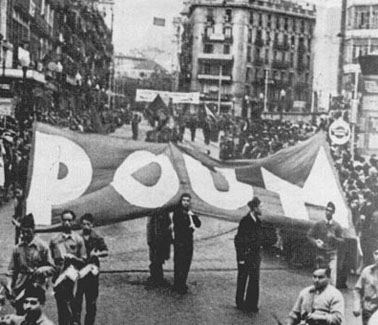
Barcelona demonstration by POUM militia George Orwell fought for in Spanish Civil War, c. 1936—1937.
* “The May Days of 1937.” From Wikipedia, the free encyclopedia. Sometimes also called May Events, referring to a series of clashes between 3 and 8 May 1937. A period of civil violence in Catalonia, when factions of the Republican side engaged each other in street battles in various parts of Catalonia, in particular in the city of Barcelona, during the Spanish Civil War. (This finally ended local control by the anarchist union, CNT. )
* “George Orwell’s Barcelona: Exploring the Catalan capital’s civil war ghosts.” Sarah Gordon, Daily Mail. 24 November 2009.
* “Homage to Catalonia by George Orwell.” From Barcelona-Life.com – a good short account of Orwell’s (and his wife’s) 1936—1937 adventures in Catalonia, struggling (like the Abraham Lincoln Brigade from the USA and the Mackenzie-Papineau Battalion from Canada) to save the Spanish Second Republic from General Francisco Franco.
